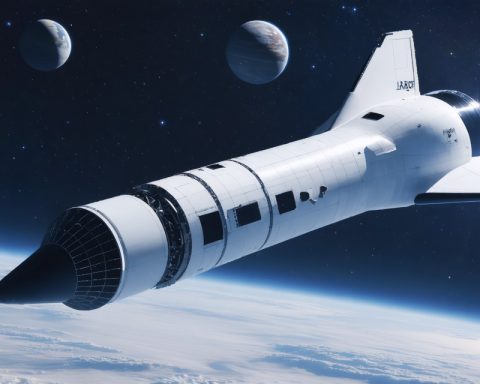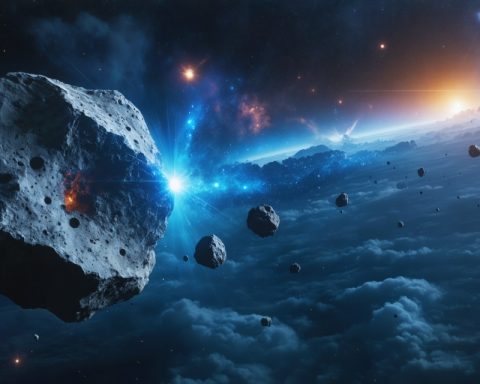In recent years, the allure of space mining has captivated scientists and entrepreneurs alike, with meteorites drawing particular attention due to their rich mineral composition. Traditionally seen as celestial debris, these space rocks are now considered potential treasure troves of metals such as platinum and gold, essential for our tech-driven society.
Meteorites, remnants of our solar system’s formation, hold valuable insights into the raw materials available in space. Their composition can include rare metals and minerals that are increasingly scarce on Earth. As nations and private companies race to develop space technology, meteorites could become a cornerstone of a new economic frontier.
What makes meteorites especially appealing is the technology that might allow us to harvest these space rocks. Advances in AI and robotics mean that, by the end of the decade, we could have autonomous missions designed to capture and return these cosmic visitors. Such technology not only opens prospects for resource acquisition but also for scientific data collection, offering a glimpse into the history and formation of celestial bodies.
By investing in meteorite mining, we could transition into an era where space resources supplement Earth’s reserves. This not only promises economic benefits but also positions humanity at the brink of a resource revolution. In this bold exploration, meteorites might be more than mere stones; they could be the pillars of a sustainable future in the cosmos.
The Impact of Space Mining on Humanity’s Future
As the burgeoning field of space mining turns its eyes towards meteorites, humanity stands on the precipice of a transformative era. These celestial objects, packed with rare metals like platinum and gold, offer a unique opportunity to revolutionize how we approach resource acquisition. The environmental, economic, and societal impacts of extracting minerals from meteorites are vast and multifaceted.
Environmental Impacts:
The potential of space mining to supplement Earth’s dwindling mineral reserves could significantly mitigate the environmental degradation associated with traditional mining practices. Mining activities on Earth often lead to deforestation, soil erosion, and the contamination of water resources, resulting in severe ecological consequences. By harvesting materials from space, we stand to reduce the strain on our planet’s ecosystems, preserving natural habitats and promoting biodiversity.
However, this endeavor is not without its environmental concerns. The journey to and from space requires substantial energy and resources, which could contribute to carbon emissions if not managed sustainably. As such, developing eco-friendly space travel technologies will be crucial to ensure that the environmental benefits of asteroid mining are realized without further harming our planet.
Humanity and the Economy:
The economic implications of space mining are poised to redefine global markets. By tapping into the wealth of resources embedded within meteorites, nations and corporations could access a new, nearly limitless supply of essential metals. This influx has the potential to lower the costs of high-tech devices, medical equipment, and renewable energy technologies, driving innovation and economic growth. Moreover, space mining could diminish geopolitical tensions over Earth’s remaining resources, fostering international collaboration in space exploration and technology development.
Furthermore, the pursuit of space mining can create a plethora of new jobs, not only in space technology sectors but also in associated fields such as robotics, AI development, and astrophysics. This economic expansion may leave a substantial impact on global poverty reduction and uplift communities worldwide.
The Future of Humanity:
Looking to the horizon, space mining extends humanity’s reach into the cosmos and establishes a presence beyond our planet. It signifies a profound shift in how we view Earth’s resources—not as finite treasures to be depleted, but as placeholders until we can effectively harness the bounty of our solar system. The success of space mining endeavors will likely catalyze further exploration into space colonization, potentially positioning humanity to become a multi-planetary species.
In conclusion, while the technology to actualize space mining is still in development, the pursuit of this frontier holds the promise of a new era for humanity. It encompasses a planetary commitment to stewardship, economic prosperity, and the sustainable use of resources. By redefining our relationship with the universe, meteorites may indeed be the pillars supporting humanity’s sustainable future in the cosmos.
The Future of Space Mining: Exploring the New Frontier
The concept of space mining is rapidly evolving from the realms of science fiction into a feasible enterprise, largely driven by the pursuit of valuable resources on meteorites and asteroids. As we advance into this new frontier, several aspects such as technological developments, economic implications, and sustainable practices are coming to the forefront.
Technological Innovations Fueling Space Mining
The success of space mining hinges on groundbreaking technological innovations. The integration of artificial intelligence (AI) and robotics is set to revolutionize the way we approach extraterrestrial resource acquisition. These technologies could enable fully autonomous missions that identify, harvest, and return materials from meteorites with minimal human intervention. The development of sophisticated sensors and autonomous navigation systems will make it possible to accurately locate rich deposits of rare metals and minerals, while robots equipped with advanced dexterity and endurance will extract these materials efficiently.
Economic Implications and Market Trends
The market potential of these cosmic resources is staggering. With dwindling reserves of critical materials like gold and platinum on Earth, meteorites are being eyed as a potential supply chain disruptor. Analysts predict that space mining could become a trillion-dollar industry, with major stakeholders including national space agencies, private aerospace companies, and tech conglomerates investing heavily in this sector. This burgeoning industry is also expected to create a myriad of opportunities in adjacent sectors such as logistics, data analysis, and environmental science.
Sustainability and Ethical Considerations
A significant advantage of space mining is its potential contribution to sustainability on Earth. By supplementing terrestrial resources, space mining could alleviate the environmental impact associated with traditional mining practices. This aligns with global sustainability goals by reducing deforestation, soil erosion, and water pollution. However, ethical considerations must also be addressed. The governance of space resources requires international cooperation to prevent monopolization and ensure equitable distribution of benefits across all nations.
Security and Legal Frameworks
As space mining ventures progress, the need for robust security and legal frameworks becomes paramount. Protecting the intellectual property and technological advancements of companies is crucial to deter potential cyber threats and industrial espionage. Establishing clear legal guidelines is also essential to address property rights and resolve disputes, ensuring peaceful and cooperative use of space resources.
The Road Ahead: Predictions and Insights
Looking towards the future, the path to successful space mining will likely involve a combination of private and public partnerships. Innovations in propulsion technologies and the development of more efficient spacecraft will further reduce costs and increase the feasibility of regular mining missions. As we inch closer to this promising horizon, the collaboration between governments, scientific communities, and industries will be key to unlocking the full potential of space mining.
For further insights into space technology and advancements, visit the main domain of NASA.



















